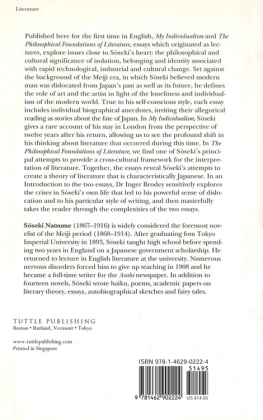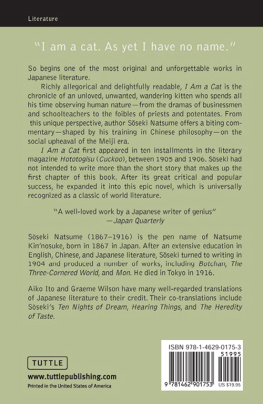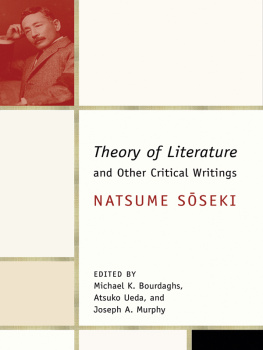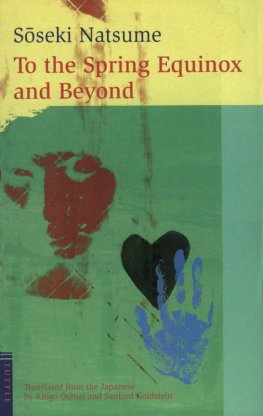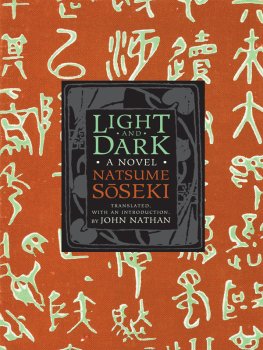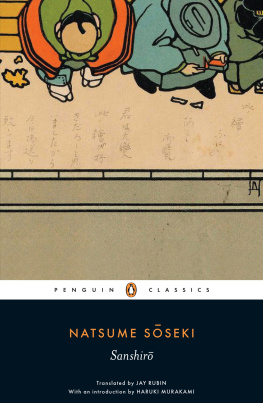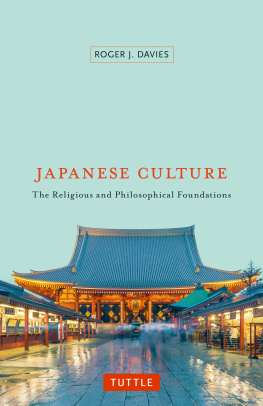My Individualism
and
The Philosophical Foundations of Literature
Sseki Natsume (1867-1916) is widely considered the foremost novelist of the Meiji period (1868-1914). After graduating from Tokyo Imperial University in 1893, Sseki taught high school before spending two years in England on a Japanese government scholarship. He returned to lecture in English literature at the university. Numerous nervous disorders forced him to give up teaching in 1908 and he became a full-time writer for the Asahi newspaper. In addition to fourteen novels, Sseki wrote haiku, poems in the Chinese style, academic papers on literary theory, essays, autobiographical sketches and fairy tales.
Sammy I. Tsunematsu is founder and curator of the Sseki Museum in London, and the translator of several of Ssekis works. He has also researched and published widely on the Japanese artist Yoshio Markino, who was a contemporary of Ssekis living in London at the beginning of the twentieth century. Tsunematsu has lived in Surrey, England, for thirty years.
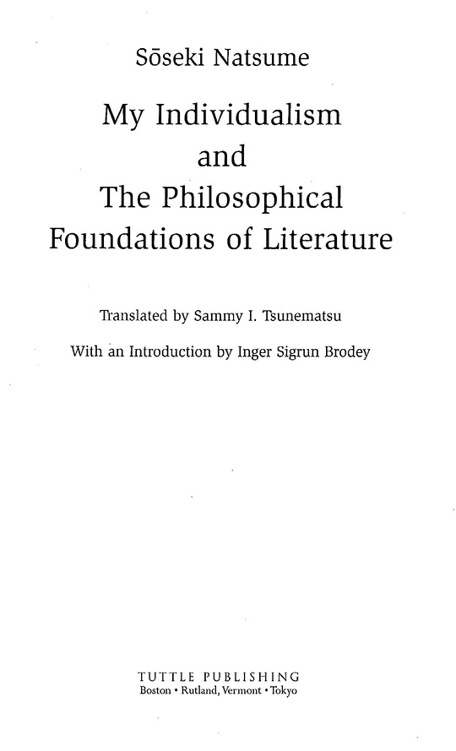
Published by Tuttle Publishing, an imprint of Periplus Editions (HK) Ltd, with editorial offices at 364 Innovation Drive, North Clarendon, VT 05759 U.S.A. 61 Tai Seng Avenue, #02-12 Singapore 534167.
English translation Sammy I. Tsunematsu, 2004
First Tuttle edition, 2004
All rights reserved. No part of this publication may be reproduced, stored in a retrieval system or transmitted in any form or by any means, electronic or mechanical, including photocopying, recording or any information storage and retrieval system, without prior permission of the publisher.
ISBN 978-1-4629-0222-4
The Translator would like to acknowledge the assistance of John Edmondson who kindly read through the English version and made many helpful changes.
Printed in Singapore
Distributed by:
North America, Latin America and Europe
Tuttle Publishing
364 Innovation Drive,
North Clarendon,VT 05759-9436.
Tel: (802) 773 8930; Fax: (802) 773 6993;
E-mail: info@tuttlepublishing.com
www.tuttlepublishing.com
Japan
Tuttle Publishing
Yaekari Building, 3F, 5-4-12 Osaki,
Shinagawa-ku, Tokyo 141-0032.
Tel: (813) 5437 0171; Fax: (813) 5437 0755;
E-mail: tuttle-sales@gol.com
Asia Pacific
Berkeley Books Pte Ltd
61 Tai Seng Avenue, #02-12
Singapore 534167
Tel: (65) 6280 1330; Fax: (65) 6280 6290
E-mail: inquiries@periplus.com.sg
www.periplus.com
This translation is dedicated to Professor Nakashima Saikichi and Professor Nishi Tadaomi in recognition of their warm encouragement and support.
OTHER TUTTLE CLASSICS
BY THE SAME AUTHOR
And Then
Botchan
Grass on the Wayside
Hearing Things
The Heredity of Taste
I Am a Cat I, II, III
Inside My Glass Doors
Kokoro
Light and Darkness
Mon
Record of Chips and Shavings
Spring Miscellany and London Essays
Ten Nights of Dream
The Three-Cornered World
To the Spring Equinox and Beyond
The 210th Day
The Wayfarer
Contents
Introduction
A Crisis of Belonging
From his earliest years, Sseki Natsume (or Natsume Kinnosuke, as he was born), experienced a series of crises concerning his sense of belonging and identity. The sad events of the first years of his life led to a powerful sense of dislocation that permeates his oeuvre . As we shall see in the important essays now available in English for the first time in this volume, his personal experiences led him to consider the philosophical and cultural significance of human isolation from a variety of perspectives. It is impossible to say whether Sseki would have been as preoccupied with issues of isolation and belonging if he had not also lived in Meiji Japana culture obsessed with the issues regarding belonging and identity that arise from rapid change and dissociation from ones past. In any case, although a genius in his own right, the similarity between his individual concerns and the broader cultural concerns of the Meiji period enhanced the reception of his work and led him to become one of Japans most important modern authors. His popularity is witnessed in contemporary material culture by the fact that Ssekis face still circulates in Japan on the 1000 notean honor that Sseki might have declined, had he had the opportunity to do so, just as he declined many other public honors.
Ssekis parents were upper-class administrators who found their social standing suddenly undercut with the fall of the feudal system, as the Tokugawa Shogunate collapsed. Partially because of their financial embarrassments, they gave their youngest son Kinnosuke to a local greengrocer. The green-grocers, busy with their daily work, neglected Kinnosuke, leaving him outside their shop in a basket. Finally, taking pity upon her young brother lying outside in the cold, one of Kinnosukes sisters brought him home to his original parents. His parents gave him away again after a year, this time to a childless former servant named Shiobara and his wife. Domestic troubles eventually led the couple to divorce, and Kinnosuke returned to his original family. Kinnosuke, however, was unaware of his relation to his new guardians, thinking that his parents were more distant relatives. At age 21, he finally regained the family name Natsume, and a year later, adopted the pen name Sseki, by which name he is commonly known today. His three successive families, the two aborted attempts to give him away, and his four name changes all lent considerable chaos to Ssekis first two decades of life.
Ssekis own life span (18671916) coincided almost exactly with the long reign of Emperor Meiji (18681912), and thus with the Meiji Era that witnessed unprecedented change in Japan. Ssekis birth succeeded the arrival of Admiral Perrys black ships by only fourteen years. In 1868, when Sseki was one year old, Emperor Meiji proclaimed his Five Articles that ousted the samurai from their seats of power, promoted Western-style education, and opened the door for a wide range of institutional and social reforms. The following decades witnessed a fascination with things Western, leading to sights that would have been unimaginable only a decade earlier. Alongside these cultural changes occurred the tremendous technological and industrial advances that transformed the Japanese economy and urban landscape. Sseki lived to see the death of Emperor Meiji in 1912, and died four years later, in 1916. The events of Meiji left an indelible mark on him and others of his generation; all of his literary works reflect his preoccupation with the cultural and spiritual dangers associated with such rapid change.
Just as Sseki moved from house to house as a young child and grew to be a stranger in his own home, not even recognizing his own parents, Sseki describes the modern Meiji man as straddling cultures, dislocated both from Japans past as well as from its future. This modern man, as Sseki depicts him, has irreparably lost the innocence and moral integrity connected with Japans neo-Confucian past, and is at the same time inexorably attracted to modernity, the West, and material success (c.f. Brodey and Tsunematsu, pp. 115). As a character says in his novel Kokoro , published in the same year as My Individualism: You see, loneliness is the price we have to pay for being born in this modern age, so full of freedom, independence, and our own egotistical selves! In the two essays reproduced in this volume, Sseki self-consciously defines the role of art and the artist in light of the loneliness and individualism of the modern world.
Redefining Japanese Literature for a Modern Age
Next page
